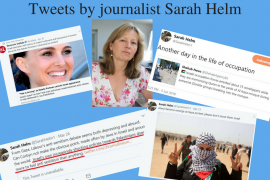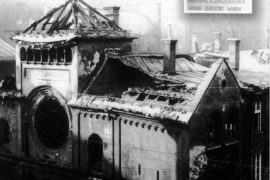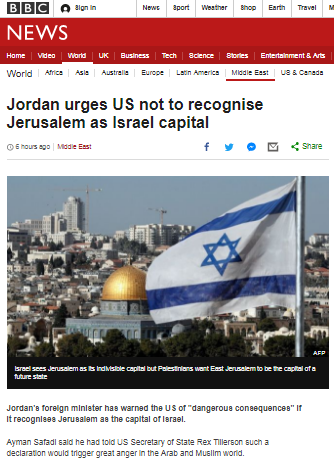The Guardian brought back their former Jerusalem correspondent Peter Beaumont to provide an analysis of the current IDF operation in Jenin, the city that represents the largest single source of terror emanating from the West Bank.
The piece (“Jenin, then and now. Weakness of the Palestinian security forces is key difference”, July 3) concludes thusly, suggesting that such military efforts aimed at reducing the terror capacities of Palestinian extremists are futile:
One thing is clear, however. Revisiting large scale violence on Jenin and other Palestinian cities – as the experience of Gaza has amply demonstrated – will not solve the long-term and toxic issues of occupation and settlement building.
A piece by the veteran Guardian columnist (and former foreign editor) Simon Tisdall (“Netanyahu’s attack on Jenin shows weakness. The Palestinians are weak too – and therein lies the danger”, July 4) reaches the same conclusion:
Before it’s even over, the outcome of this latest confrontation is already clear: more misery, hate. More death – and another dead end.
…
[The operation] will not eliminate terror, as right-wingers claim, nor radically alter the balance of fear. It could trigger a wider, uncontainable crisis.
…
As in 2002, the battle of Jenin will create more “martyrs”, raise more recruits for terror, leave Israel less, not more secure.
In fairness, this take on the putatie futility of Israeli resistance to Palestinian terror isn’t exclusive to the Guardian.
In an op-ed for The i (“Israel’s military action will not extinguish the Palestinian struggle for political rights”, July 3) Donald Macintyre echoes the refrain:
All experience suggests that military action, whatever its short-term consequences, does not in the end extinguish the Palestinian struggle for the political rights enjoyed by their Israeli neighbours
His colleague at The i, Kieron Monks, shares these sentiments, in his op-ed (“Israel’s extremists get the West Bank war they wanted, but Palestinian militants could benefit”, July 3).
Before quoting Yossi Mekelberg, a Middle East analyst at the Chatham House, explaining that the Israeli operation is “based on the mistaken belief that there is a military solution to Israel’s conflict with the Palestinians”, and that “the death of the peace process, and hope for statehood, has removed the most potent argument against the armed struggle”, Monks expresses his own thoughts:
Local support [for Jenin terror groups] is likely to increase as the [IDF] operation continues.
First, before addressing the merits of their arguments, let’s clarify why the UN-administered area of Jenin is the current focus of Israeli military operations: a staggering 45% of its residents are believed to be affiliated with terror groups; more than 50 shooting attacks this year were carried out by terrorists from that area of the city; Iran has stepped up efforts to strengthen its proxy Palestinian Islamic Jihad (PIJ), which has a significant base of operations in Jenin; and the city houses sophisticated weapon-making factories for use in future terror attacks.
Now, turning to the substance of four journalists’ take on the Jenin operation.
First, it’s asserted that the operation will not end terrorism, which is a straw man argument, as neither the government nor the military has ever maintained that this is their objective. Eroding, rather than destroying, terrorist capabilities in Jenin, is the military objective.
Second, there’s the cliche that the anti-terror operation will only make the terrorists angrier, more radical and, thus, result in increased terror, and that the root-cause of the violence is the absence of a peace process, as well as settlement construction and Israel’s occupation.
This latter point is among the most morally obtuse and ahistorical accounts of what drives the conflict. The suggestion that extremists from Hamas, PIJ and other terror groups murder innocent Israeli civilians out of frustration with the lack of progressive towards two-states, or out of frustration over Jews building homes within existing settlement blocs, is belied by, well, most of what’s actually occurred in the region since Olso.
Let’s recap.
The orgy of Palestinian violence known as the 2nd Intifada began shortly after Israeli leaders offered Palestinians a state, and continued even as Ehud Barak made an even more generous offer – one that would have given Palestinians almost everything they asked for – six months later.
Following Israel’s unilateral withdrawal from Gaza in 2005, a plurality of Palestinian voted for Hamas, the antisemitic extremist group that rejects Israel’s right to exist. The terror group’s rise to power resulted in thousands upon thousands of rockets fired at Israeli civilians, and several rounds of war between Gaza and Israel.
In 2008, Mahmoud Abbas turned down another offer by Israel that would have created – again, for the first time in history – a sovereign Palestinian state.
Finally, let’s remember that Hezbollah – another proxy of the Islamic Republic – only grew in military strength and influence in Lebanon after Israel unilaterally withdrew from every square meter of Lebanese territory in 2000.
There are, to be sure, very good reasons to object to unrestrained settlement construction, as there are good reasons – regardless of the current dismal state of the ‘peace process’ – to keep the channels of negotiations between Israel and the Palestinians open.
However, to continue arguing that Israeli control of disputed territories, and the homes constructed there, are the root cause of the conflict, not only airbrushes the past thirty years of the conflict, it also characteristically denies agency to Palestinians, who are rarely covered as if they were moral actors – agents of their own fate.
To those not in thrall to the liberal racism which infantilises Palestinians, those truly independent thinkers willing to push back against the conventional moral wisdom suggesting that weak makes right, thus acknowledging that bad Palestinian decisions inextricably lead to bad Palestinian outcomes, IDF military actions, in Jenin or elsewhere, can be seen as the result of Palestinian terror and extremism, not their cause.






Any opinion or view from The Grauniad is useful providing one appreciates that the opposite of their reported “facts” are always correct.